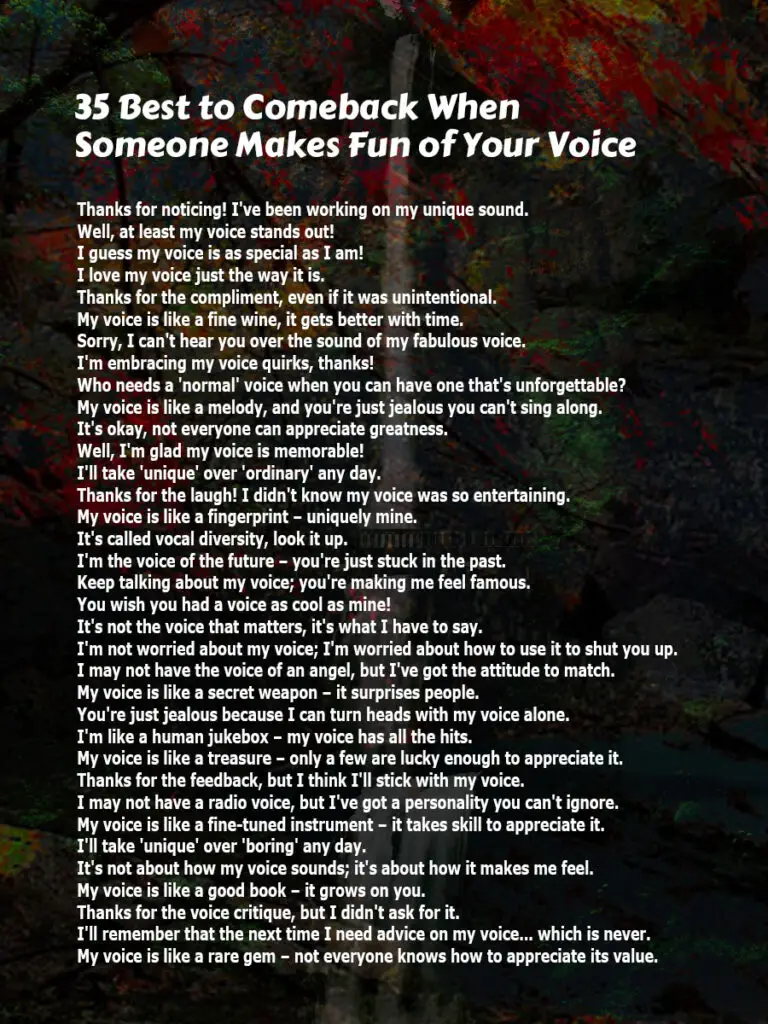Have you ever felt hurt when someone teased your voice? You’re not alone. It’s common to feel upset, but remember, there are ways to handle it positively. In this blog post, we’ll explore great comebacks you can use when faced with voice teasing.
These comebacks are friendly, funny, and most importantly, they help you stand up for yourself without being mean. Whether your voice is high, low, squeaky, or deep, there’s a perfect comeback for you. Let’s dive in and learn how to respond confidently the next time someone makes fun of your voice!

Here are 35 Best to Comeback When Someone Makes Fun of Your Voice:
- Thanks for noticing! I’ve been working on my unique sound.
- Well, at least my voice stands out!
- I guess my voice is as special as I am!
- I love my voice just the way it is.
- Thanks for the compliment, even if it was unintentional.
- My voice is like a fine wine, it gets better with time.
- Sorry, I can’t hear you over the sound of my fabulous voice.
- I’m embracing my voice quirks, thanks!
- Who needs a ‘normal’ voice when you can have one that’s unforgettable?
- My voice is like a melody, and you’re just jealous you can’t sing along.
- It’s okay, not everyone can appreciate greatness.
- Well, I’m glad my voice is memorable!
- I’ll take ‘unique’ over ‘ordinary’ any day.
- Thanks for the laugh! I didn’t know my voice was so entertaining.
- My voice is like a fingerprint – uniquely mine.
- It’s called vocal diversity, look it up.
- I’m the voice of the future – you’re just stuck in the past.
- Keep talking about my voice; you’re making me feel famous.
- You wish you had a voice as cool as mine!
- It’s not the voice that matters, it’s what I have to say.
- I’m not worried about my voice; I’m worried about how to use it to shut you up.
- I may not have the voice of an angel, but I’ve got the attitude to match.
- My voice is like a secret weapon – it surprises people.
- You’re just jealous because I can turn heads with my voice alone.
- I’m like a human jukebox – my voice has all the hits.
- My voice is like a treasure – only a few are lucky enough to appreciate it.
- Thanks for the feedback, but I think I’ll stick with my voice.
- I may not have a radio voice, but I’ve got a personality you can’t ignore.
- My voice is like a fine-tuned instrument – it takes skill to appreciate it.
- I’ll take ‘unique’ over ‘boring’ any day.
- It’s not about how my voice sounds; it’s about how it makes me feel.
- My voice is like a good book – it grows on you.
- Thanks for the voice critique, but I didn’t ask for it.
- I’ll remember that the next time I need advice on my voice… which is never.
- My voice is like a rare gem – not everyone knows how to appreciate its value.
See Also: 35 Great Ways to Say Don’t Threaten Me With a Good Time
Building Confidence
Boost your confidence after being mocked for your voice. Practice self-acceptance, improve vocal skills, and seek supportive individuals for a positive comeback.
Positive Self-talk
- Remind yourself that your voice is unique and valuable.
- Focus on your strengths and the positive aspects of your communication.
- Challenge negative thoughts with affirmations and self-compassion.
Voice Training Exercises
- Practice breathing exercises to improve vocal control and projection.
- Engage in vocal warm-ups to enhance articulation and clarity.
- Seek professional guidance from speech therapists for personalized training.
Effective Communication Techniques
When faced with mockery or ridicule about your voice, effective communication techniques can help you regain your confidence and handle the situation with grace. By practicing articulation, engaging in breathing exercises, and maintaining a composed demeanor, you can overcome the challenge and assert your authentic self.
Articulation Practice
Articulation practice involves focusing on clear and distinct pronunciation of words. By enunciating each syllable, you can enhance the clarity and precision of your speech. This can help assert authority and convey confidence despite any mockery you may face. Engage in tongue twisters, and practice speaking slowly and deliberately to ensure your words are effectively communicated.
Breathing Exercises
Breathing exercises are beneficial not only for vocal control but also for maintaining composure in challenging situations. Deep breathing can help calm your nerves and stabilize your voice. Focus on inhaling deeply through your diaphragm and exhaling slowly, allowing your voice to resonate with confidence and clarity.
Seeking Support
Seeking support when someone makes fun of your voice is crucial for rebuilding your confidence and finding ways to overcome the negative emotions that may arise. It’s important to remember that you are not alone in facing these challenges, and there are resources available to help you.
Speech Therapist Guidance
One option for seeking support is to consult with a speech therapist. These professionals can provide valuable guidance and techniques to improve your voice quality, articulation, and overall communication skills. A speech therapist will work with you one-on-one to identify any underlying issues and develop a personalized plan to address them.
Joining A Public Speaking Group
Another effective way to find support is by joining a public speaking group. These groups provide a safe and supportive environment where individuals can practice their speaking skills and receive constructive feedback. By interacting with others who share similar experiences, you can gain a sense of community and develop the confidence to speak up despite any insecurities or challenges related to your voice.
Handling Criticism
Receiving criticism about your voice can be disheartening and make you feel self-conscious. However, learning how to handle such criticism is crucial for your self-esteem and personal growth. In this section, we will explore two effective ways to handle criticism when someone makes fun of your voice: seeking constructive feedback and ignoring negativity.
Constructive Feedback
Constructive feedback can be a valuable tool for improvement. Rather than dismissing criticism as mere mockery, take a step back and see if there is any truth in what the person is saying. Look for specific areas of improvement they have pointed out. By acknowledging this feedback, you can channel it into constructive action to enhance your voice and communication skills.
One way to seek constructive feedback is by approaching someone you trust, such as a vocal coach, teacher, or close friend. Ask them for an honest assessment of your voice and any areas they believe you can work on. Having a trusted opinion can provide valuable insights and help you develop a plan to improve your voice effectively.
Remember, constructive feedback is intended to help you grow and develop, rather than tear you down. Embrace it as an opportunity for progress and use it to fuel your determination to become even better.
Ignoring Negativity
While constructive feedback can be valuable, it’s important to recognize that not all criticism is constructive. Some people may make fun of your voice simply to bring you down or assert their own superiority. In such cases, it’s essential to learn how to ignore negativity and not let it affect your self-esteem.
One effective way to deal with negative remarks is to remind yourself of your unique qualities and strengths. Everyone has different voices, and that diversity is what makes conversations and interactions interesting. Embrace and celebrate your voice as a reflection of your individuality.
Moreover, surrounding yourself with supportive and understanding individuals can make a significant difference. Seek the company of people who appreciate you for who you are rather than focusing on your voice. Their positive energy can help shield you from the negativity of others and provide the support you need to stay confident in yourself.
Remember, the most important opinion of your voice should be your own. Embrace your uniqueness, work on constructive feedback when necessary, and let go of the negativity that does not serve you.
See Also: 25 Great Ways That Will Make You Laugh So Hard That You Will Cry
Empowering Yourself
When faced with ridicule or mockery of our voice, it’s important to remember the power we hold to empower ourselves. By embracing uniqueness and focusing on progress, we can reclaim our confidence and rise above the negativity. Let’s explore the ways in which we can empower ourselves when confronted with hurtful comments about our voice.
Embracing Uniqueness
Embracing the unique qualities of our voice is the first step towards empowerment. Our voice is a distinctive aspect of our identity, and it’s important to recognize its value. By embracing what makes our voice different, we can cultivate self-acceptance and confidence.
Focusing On Progress
Instead of dwelling on hurtful remarks, channel your energy into focusing on progress. Whether it’s through voice exercises, public speaking classes, or seeking professional guidance, commit to improving your vocal skills for your personal growth. Celebrate every small achievement as it paves the way towards reclaiming your voice with confidence.
Empowering yourself in the face of ridicule is about finding strength in your uniqueness and setting your sights on progress. Through embracing the distinctiveness of your voice and dedicating yourself to advancement, you can overcome the sting of hurtful comments and emerge stronger than before.
See Also: 25 Ways to Ask Someone If They Still Want to Talk to You
More Additional Responses
- My voice is like a hidden talent waiting to be discovered.
- If my voice bothers you, you’re paying too much attention to it.
- I’m not trying to win a voice contest; I’m just being myself.
- Thanks for the voice critique, but I think I’ll stick with my own style.
- My voice may be unconventional, but so am I!
- You must be bored if you’re critiquing my voice.
- My voice is like a rare species – it’s meant to be admired, not mocked.
- I’m not here to fit your idea of a perfect voice; I’m here to be me.
- My voice is like a good story – it keeps you interested.
- I’d rather have a unique voice than blend in with the crowd.
- If you don’t like my voice, feel free to press the mute button.
- My voice may not be for everyone, but it’s perfect for me.
- Thanks for the voice review, but I didn’t hire you as my vocal coach.
- I’m not insecure about my voice; I’m just indifferent to your opinion.
- My voice is like a rare gem – not everyone knows its true value.
- I’ll take my imperfect voice over your perfect silence any day.
- My voice is like a puzzle – it may not make sense to you, but it fits perfectly for me.
- If my voice bothers you, you might want to check your priorities.
- I’m not trying to impress you with my voice; I’m just expressing myself.
- My voice is like a painting – it’s open to interpretation, but it’s still beautiful.

I hope these comebacks help you feel stronger when someone teases your voice. Remember, your voice is unique and special, just like you. Be proud of who you are and don’t let anyone bring you down. Keep speaking up with confidence and shine brightly!









